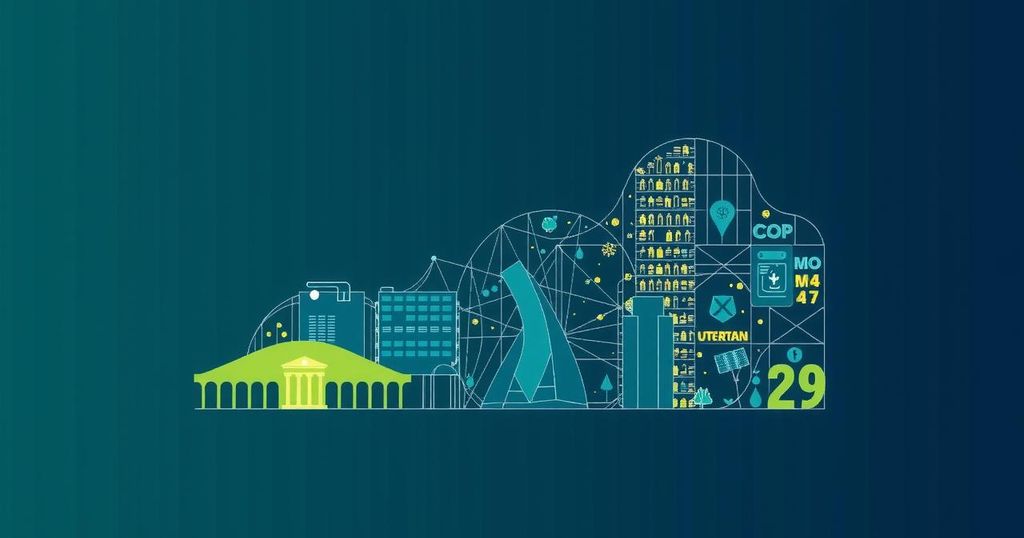Fourteen UConn students participated in COP29, experiencing a dynamic intersection of activism, policy, and innovation towards a sustainable future. They engaged in discussions on renewable energy, climate justice, and the role of the private sector in funding solutions. While criticism of COP is prevalent, the students emphasize collaboration and constructive engagement as vital for meaningful progress in combating climate change.
Fourteen students from the University of Connecticut (UConn) participated in the 29th United Nations Climate Change Conference of Parties (COP29) held in Baku, Azerbaijan. This annual event unites climate experts, policymakers, and global leaders to confront the climate crisis. The UConn@COP fellowship empowers students through experiential learning, allowing them to observe climate policy discussions firsthand. Each fellow shares reflections on their experiences in blog posts available on the UConn Office of Sustainability’s website.
Mayowa Oladele, a doctoral candidate in Chemical and Biomolecular Engineering, remarked that COP29 transcends a mere conference; it serves as a dynamic forum where activism, innovation, and collaboration intersect for sustainable development. On the initial day, Oladele witnessed a compelling protest by Niger Delta representatives advocating for reparations due to environmental damage caused by oil companies. This event underscored the inherent human consequences of environmental neglect and the immediate need for climate justice. Sessions at the Nigerian Pavilion centered around empowering youth for a green transition, reinforcing the importance of actionable solutions.
The following day, Oladele attended a session focused on the untapped potential of geothermal energy, which left a profound impression on him. Engaging discussions with panelists illuminated the viability of geothermal energy as a renewable resource. Additionally, a presidential briefing on methane reduction highlighted commitments from the Global Methane Pledge Champions, including significant updates to the United States’ emission standards for landfills.
Similarly, student Faiz Farooqui recounted his whirlwind experience in COP29’s Green Zone, where cultural events and workshops enhance the discourse surrounding climate action. He participated in a roundtable with Rishi Jain from Liverpool FC, who discussed the club’s sustainability initiatives, showcasing how sports can influence environmental stewardship.
Farooqui expressed concern about the alarming effects of climate change on vulnerable populations, citing the devastating impact on herders in Mongolia. As temperatures rise, the harsh winters threaten livelihoods, forcing nomadic communities into urban centers with overstretched infrastructure, exacerbating air pollution and health crises.
Mariam Vargas offered a perspective on overcoming the prevalent negativity surrounding COP29. She acknowledged valid criticisms regarding the choice of Azerbaijan as host and the perceived inefficacy of COP but emphasized that constructive criticism must foster solutions rather than stagnation. Vargas noted that the private sector possesses significant potential for climate finance, urging a reevaluation of their role in innovation and resources for developing countries.
The importance of COP as a platform for marginalized voices cannot be overstated. While acknowledging its imperfections, Vargas highlighted that COP remains essential for bringing underrepresented nations and indigenous communities to the fore, advocating for collective efforts to address climate change comprehensively.
In summary, the UConn participants at COP29 encountered a multifaceted exploration of climate advocacy, revealing the inherent interconnectedness of activism, innovation, and policy development. Their reflections underline the urgency of collaborative efforts to forge actionable solutions to the climate crisis, reinforcing the notion that while challenges abound, the potential for transformative change exists therein.
The annual United Nations Climate Change Conference of Parties (COP) plays a pivotal role in international climate policy, bringing together representatives from different sectors to engage in dialogue about addressing the urgent climate crisis. COP29, held in Baku, Azerbaijan, was no exception, featuring diverse voices from grassroots activists to industry leaders. UConn students attending COP29 were part of an experiential learning initiative aimed at enhancing their understanding of climate policy dynamics and fostering their engagement in environmental solutions.
The experiences of UConn students at COP29 served to illuminate the complexities of the climate crisis while highlighting the critical roles of activism, youth engagement, and innovation. While acknowledging skepticism towards the conference’s effectiveness, their narratives underscore the importance of collaboration among varied stakeholders. By addressing systemic barriers to climate solutions, fostering private sector involvement, and maintaining the integrity of COP as a platform for marginalized voices, there exists significant potential for impactful climate action.
Original Source: today.uconn.edu






